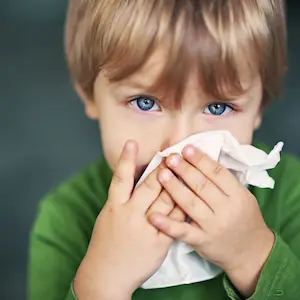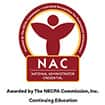Understanding and Managing Allergies in Child Care
Practical steps to prevent allergen exposure, partner with families, and respond confidently to allergic reactions in child care.

Course Overview
This online allergy awareness training for child care providers applies to children of all ages.
Wondering how to manage children's food allergies in your early childhood program? This 1-hour online course helps you understand children's allergies and create safe environments. Learn practical strategies to prevent allergen exposure, build allergy care plans, and respond confidently to allergic reactions.
Ideal for child care providers, teachers, and family child care professionals seeking annual training in allergen awareness. See the learning outcomes and topics below for full details.
This course is offered in our online format and includes audio narration in most course sections:Course formats
This course is offered in our fully online format, which includes audio narration in most course sections. Click here to learn more about Care Courses' training formats.
Acceptance information
Click to view:
This course is accepted in the following state unless indicated otherwise:
- Alabama
- Alaska
- Arizona
- Arkansas
- California
- Colorado
- Connecticut
- Delaware
- Florida
- Georgia
- Hawaii
- Idaho
- Illinois
- Indiana
- Iowa
- Kansas
- Kentucky
- Louisiana
- Maine
- Maryland - this course is accepted for elective training hours.
- Massachusetts
- Michigan
- Minnesota - this course is not accepted by MNCPD.
- Mississippi
- Missouri
- Montana
- Nebraska
- Nevada - this course is not approved for annual clock hours or to meet Nevada’s requirement for training in medication administration and allergies.
- New Hampshire
- New Jersey
- New Mexico
- New York
- North Carolina
- North Dakota
- Ohio
- Oklahoma - this course grants one hour of informal credit.
- Oregon
- Pennsylvania
- Rhode Island
- South Carolina
- South Dakota
- Tennessee
- Texas
- Utah
- Vermont
- Virginia
- Washington - this course is not accepted for Washington MERIT or Washington STARS clock hours.
- Washington, DC
- West Virginia
- Wisconsin
- Wyoming
For state-specific information, see our State Training pages.
This course is accepted for elective training hours.
This course is not accepted by MNCPD.
This course is not approved for annual clock hours or to meet Nevada’s requirement for training in medication administration and allergies.
This course grants one hour of informal credit.
This course is not accepted for Washington MERIT or Washington STARS clock hours.

The NECPA Commission, Inc. has approved this educational program as meeting the criteria for continuing education for renewing the National Administrator Credential (NAC).
Browse more approved courses: NAC renewal training.
Learning outcomes
After completing this course you will be able to:
- Explain the meanings of the terms, allergy and allergic reaction
- Identify the symptoms of both mild and severe allergic reactions in children
- Explain how children’s exposure to allergens triggers allergic reactions and how to avoid such exposure
- Describe the appropriate response to a child’s severe allergic reaction, including the role of epinephrine
Topics covered
- The meaning of the terms allergy and allergic reaction
- The types of foods and other substances that can trigger allergic reactions
- Common types of food allergies in children
- Symptoms of mild and severe allergic reactions
- How children might describe an allergic reaction they are experiencing
- Child care providers’ responsibilities in managing allergy symptoms
- The importance of Allergy Care Plans for children
- Components of an Allergy Care Plan
- Proper treatment of mild allergic reactions
- Steps for responding to severe allergic reactions including using epinephrine
- Ways to reduce children’s exposure to allergens
- The definition of allergy-induced asthma
- Child care providers’ responsibilities in managing children’s asthma symptoms
Want to learn more? Read our blog about environmental allergies: Achoo! What to do about environmental allergies in childcare.
What our students say about this course
How Care Courses® Training Works: Details & Support
Click to view:
Course Details & Support
Prerequisites
- Language: Fluent reading and writing in the language of instruction (English or Spanish).
- Technology: Internet access and a web-enabled device (computer, smartphone, or tablet).
Access & Completion Deadline
- This training expires 12 months from the date of purchase.
- To receive a certificate of completion, you must successfully finish the course before the expiration date.
Learning Methods
- Read instructor-written material
- Watch videos
- Listen to audio segments
Assessments
- Multiple-choice quizzes
- Written assignments
Requirements for CEUs and Clock Hours
To earn CEUs and Clock Hours for a course, you must:
- Agree to and acknowledge our Honor Code & Policy
- Follow all instructions for written assignments
- Demonstrate comprehension of the course content
- Achieve the passing score specified in your course.
Quizzes and Assessments
- If your score falls below the passing mark, a trainer will review your work. If needed, you may be asked to speak with a trainer.
- You will have a second chance to retake any quiz or assessment.
- If you do not pass on your second attempt, contact us at info@carecourses.com. We will review your course and follow up directly.
- All quizzes are open book; all answers are found in the course material.
Certificates
- Official Care Courses certificates of completion record your clock hours and CEUs.
- Certificates are available in the My Courses area of your account.
- Please note: All course and certificate dates and times are on Eastern Time.
Getting Started
- See how our training works on the training process page.
- Watch our course navigation video for a quick tour of the online portal.
- Free Unlimited Assistance
- We’re here to help with training, billing, and technical support questions.
- Phone: 1-800-685-7610 (Mon–Fri, 9:00 a.m.–5:00 p.m. Eastern)
- Email: info@CareCourses.com or techsupport@CareCourses.com (days, evenings, and weekends)
About Care Courses
- Care Courses offers over 50 professional development courses and one non-credit training tutorial on the CDA process.
- All professional development courses include clock hours, CEUs, and an official online certificate of completion.
- (The free CDA tutorial does not offer clock hours or a certificate.)
Tuition & Bundles
- Course tuition entitles one person to receive the clock hours and CEUs granted upon successful completion.
- Bundle pricing covers tuition for all courses included in the bundle.

